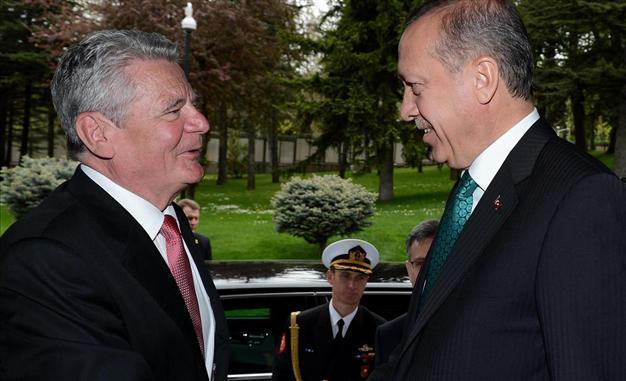German President Gauck thinks he is still a pastor, Turkish PM Erdoğan says
ISTANBUL

Erdoğan said Gauck’s hardened rhetoric in the ODTÜ speech was different than the way the two talked in an April 28 meeting. AA Photo
German President Joachim Gauck supports Turkish atheists in Germany – a sign that he “probably thinks that he is still a pastor,” Prime Minister Recep Tayyip Erdoğan has said after the visiting head of state questioned Turkey’s democracy.
“We told him: We cannot tolerate interference in our country’s domestic affairs,” Erdoğan said in a parliamentary group meeting on April 29.
“One should do whatever being a statesman requires. I suppose he still deems himself a pastor because he was a pastor at the time and he is looking with that view. These are awful things,” he said in an apparent reference to the fact that Gauck was a former East German Lutheran pastor who campaigned for the 1989 fall of the Berlin Wall.
Erdoğan was particularly perturbed by a speech delivered by Gauck at Ankara’s Middle East Technical University (ODTÜ) as part of a state visit to Turkey. According to the prime minister, although the speech was delivered after a two-hour long meeting with him, Gauck preferred to highlight what he was told by the Alevi community in Germany and by those at ODTÜ instead of the information already imparted by himself.
“In Germany, there is something called ‘Alevism without Ali,’ which is an atheist belief presented under the guise of Alevism, also supported by [Gauck], and he presented it to us. In Turkey, there is no such Alevism. [Gauck] spoke the way that a small group in Germany, supported by Germans, speaks. This is improper,” Erdoğan said, without elaborating on why a Christian cleric might defend atheism so forcefully.
Alevism is widely perceived as a liberal sect of Islam, although many characterize it as a belief system separate from Islam.
“The German president goes to ODTÜ after speaking with me and he says weird things there. Whichever lies and wrongful things that he was told and he was taught, he expresses them,” Erdoğan said. “You know what is saddening? It is the fact that those hosting him at ODTÜ did not tell the truth to him,” he added, reflecting his well-known dislike of ODTÜ’s academic staff.
In December 2012, over 3,000 police officers were on hand to guard Erdoğan as he came to ODTÜ on Dec. 18 to witness the launch of Turkey’s first-ever domestically produced satellite, the Göktürk-2. Several hundred students staging a protest at his presence were attacked by the police, resulting in clashes and injuries.
At the time, Erdoğan heavily criticized ODTÜ Rector Ahmet Acar and his academic staff for supporting the students and blaming police for violence that left one demonstrator seriously injured.
In an apparent response to Gauck’s remarks suggesting that the Turkish government’s intervention into social media and judiciary displayed weakness even though the government “had so much power after an important election victory,” Erdoğan said: “We told him ‘There is no such hesitation and fear, where did you get that idea?’ Above all, we told him that we cannot tolerate interference in our country’s internal affairs.”
In his speech at ODTÜ on April 28, Gauck warned against the consequences of curbing freedom of expression while criticizing Erdoğan’s leadership style.
While praising Turkey for the progress made under Erdoğan on issues such as the economy and the Kurdish peace process, Gauck said, “Recently we have also heard voices of disappointment, bitterness and outrage at a style of leadership which many see as a risk to democracy.”
Gauck said he was shocked by the government’s attempts to stamp out street protests and clamp down on the media – a move that saw Twitter blocked for two weeks in the run-up to March 30 local elections, won comfortably by Erdoğan’s Justice and Development Party (AKP).
Egypt, Gezi and mediaDuring the same speech, Erdoğan used the condemnation of the mass death penalty sentences meted out in Egypt to supporters of ousted Islamist President Mohamed Morsi as an opportunity to attack the Turkish media, accusing it of ignoring the death sentences in Egypt even though they supported the Gezi unrest in the name of democracy.
“Indifference to the world and approval of the coup in Egypt by remaining silent have unfortunately played an encouraging role in these reckless decisions,” Erdoğan said referring to the mass death penalty sentences.
The European Union, Russia and the United States also received their share from Erdoğan for remaining silent vis-à-vis the developments in Egypt.
“When anti-government demonstrations started in Tahrir Square, Westerners considered it as a freedom movement and encouraged it,” Erdoğan said, suggesting that supporters of Tahrir Square kept silent on social media after the military coup.
The same circles have also remained silent even though young people in Ukraine have been provoked into street demonstrations under the pretext of freedom, he said.
“I’m calling on those who assumed a stance against us during the Gezi incidents, particularly those in print, visual and social media: There, 12 trees were replaced. You thought that you would like to turn Turkey upside down because of this. Well, how will you explain that you remained silent to the death sentences for 529 people and later 683 death sentences?” Erdoğan asked.
